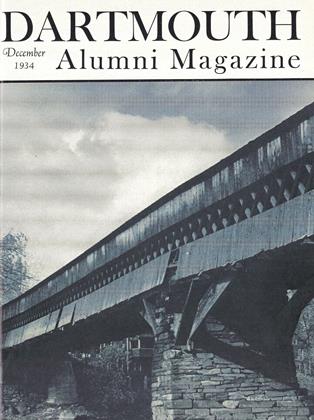THE DARTMOUTH office used to be a pleasant place. Battlescarred desks and tables; antiquated typewriters, clicking the practised tattoo of experienced journalists or the fumbling clatter of freshman heelers; mouldy files of newspapers, meaning little but lending a professional air; litter and rubbish everywhere. But the cynical atmosphere of news gathering and the smell of printer's ink pervaded the place. When junior editors of the hard-boiled school—Ax Warden and Bob Proctor were shining examples—sat at the news desk and commanded the paper to take shape, things happened.
Editors-in-chief of all sizes and temperaments succeeded each other back in those days. There was Harvey Hood, who had the whole College under his wing; Freddy McCrea, soft of voice but determined of purpose; Ax Warden, a newspaperman before he ever saw Hanover; and then little Ned Price, Frank Horan, one of the best of all time, and Pete Howe. Pete was spotted as a future editor-in-chief the day he made his first freshman appearance in THE DARTMOUTH office. The rebel cry of later years was no daily feature of editorial policy, but the boys hammered away at their causes—compulsory chapel, support of the teams, fair play by the fraternities, and all the rest of them.
Putting the paper to bed was no chore at all. Ray McPartlin would ask for the privilege three times a week. It meant fooling with slugs and type down at Frank Musgrove's press until four in the morning, scanning the proofs for Ed Boyle's last-minute obscenities, filling up gaps in the forms with stock ads or meaningless emblems—and then toast side of peanut butter at Phil's, and usually a quota of cuts for the morning's classes.
THE DARTMOUTH went daily in the fall of 1919. It was a breathless occasion for all who had any share in it, when the Associated Press contract was signed and the first dispatches came over the telephone "pony" circuit between 11:45 and midnight. Ninety words a minute battered on the receiver's eardrums, while his trembling fingers tried desperately to transmit the words to paper by way of the typewriter keyboard. The voice on the telephone and the rattling of the keys warred with each other. A mere whisper within the room was an unbearable distraction. The tortured soul at the typewriter was wrong any way he looked at it: If he broke the connection and asked for the repetition of a dispatch, he would bring down on the new-born DAILY DARTMOUTH the scorn of the old hands on the other two points of the circuit. If he confused the meaning of a news item, he foresaw breach of contract with the Associated Press and a lawsuit for heavy damages. Somehow the thing worked out, and in no time at all the College had come to accept the latest murders, riots and kidnappings as the natural accompaniment of the morning meal.
Getting the news out of Hanover and safely into the metropolitan press was still another side of the picture. When a real storv broke, there was a Press Club scramble for typewriters, a fearful struggle for concentration, and then a mad rush for the telegraph office. The lead sentence, regardless of all else, must be a work of art; and Johnny Moore was conceded the palm for packing that sentence to the limit—drawing it out clause by clause until the tension loosed itself in the grand climax that told the story.
But Dan Featherston was the grand mogul of the Press Club. Dan was a business man, caught up by some mysterious chance in the whirl of journalism. How it all happened he may have wondered himself, but at one time he was almost the whole Press Club alone and unaided. He was official correspondent for the Associated Press, the Boston Globe, the Springfield Republican, three or four New York papers and as many in Philadelphia. Handling an assignment of that scope required genius, but Dan had it. Ten or twelve newspapers each had their own "special correspondent," and they got their ten or twelve different versions of the same story, all from the same fluent pen.
 View Full Issue
View Full Issue
More From This Issue
-
 Article
ArticleHANOVER BROWSING
December 1934 By Herbert F. West '22 -
 Class Notes
Class NotesClass of 1914
December 1934 By Edward Leech -
 Class Notes
Class NotesClass of 1911
December 1934 By Prof. Nathaniel G. Burleigh -
 Class Notes
Class NotesClass of 1918
December 1934 By Allan C. Gottschaldt -
 Article
ArticleHIS EXCELLENCY, THE GOVERNOR
December 1934 By Prof. Herbert W. Hill -
 Class Notes
Class NotesClass of 1910
December 1934 By Harold P. Hinman
Article
-
 Article
ArticleEDUCATION BUREAU REPORT SHOWS GROWTH OF COLLEGE
March, 1922 -
 Article
ArticleArt Symposium
May 1935 -
 Article
ArticleMedical School Plans
November 1957 -
 Article
ArticleThe New Medical School
JUNE 1959 -
 Article
ArticleGive a Rouse for
NOVEMBER • 1987 -
 Article
ArticleWhy Does U.S. News & World Report Rank Dartmouth First In Student Satisfaction?
December 1991

